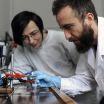Citizen scientists discover new plant species in the Cape Floral Kingdom
2015-03-19
(Press-News.org) Amateur botanists in the Western Cape Province of South Africa have discovered two new species of beautiful blue-flowered legumes. The study was published in the open access journal PhytoKeys.
Few people take the chance to tramp the empty rolling ranges of mountains and the fragmented and jagged coastline of the Southern Cape in South Africa. Most avoid it because of how wild and tough-going it can be.
This region is part of a unique and species rich global flora called the Cape Floral Kingdom. Yet there are a band of intrepid walkers and climbers who traverse these areas every week searching for rare and endangered plants.
One such group call themselves the Outramps (Afrikaans for Senior walkers). They are part of bigger group of amateurs who belong to a Citizen science group called C.R.E.W. (Custodians of Rare and Endangered Wildflowers) which is run by the South African Biodiversity Institute (SANBI). 'Crewites', as they are called locally, are volunteers from the public who help with monitoring and conserving South Africa's threatened plants.
The Outramps are the most active CREW group in South Africa and are led by their indomitable leader Dianne Turner. She and her group, in their dilapidated and famous Kombi called 'The Buchu Bus' have crisscrossed the region many times and have assessed the conservation status of many rare species.
Recently they discovered two beautiful blue-flowered legumes which they thought were new to science. They sent these to Abubakar Bello (a Nigerian student doing a Ph.D. on the legume tribe Psoraleeae at the University of Cape Town) and one of his supervisors Prof. Charles Stirton.
After a field trip with their colleague Prof. Muthama Muasya, to see them in the field and after comparing them with known species, they were identified as new members of the legume genus Psoralea.
As Charles Stirton told us "Without the persistence and enthusiasm of the Outrampers, we would never have picked up these species in our studies as they were in areas we would not have accessed in our planned field trips. It is not uncommon for highly localised species to be overlooked by monographers".
To honour the Outrampers, they decided to name the new species after the group leader Dianne (Psoralea diturnerae) and the ace photographer in the group Nicky van Berkel (P. vanberkelae) who discovered the plants respectively.
Di's Psoralea (P. diturnerae) is a mountain species and is known from only a few localities around the Camferskloof area in the Outeniqua mountains.
Nicky's Psoralea (P. vanberkelae) is locally abundant in an area of less than 20 km2 coastal habitat along the Robberg Coastal Corridor. Fortunately, the main population is owned and protected by a keen conservationist Chris von Christierson in his private Fynbos Private Nature Reserve. This stunning species is a flagship species for this wild and relatively unknown coastal strip where the cliff edges rise sharply from the sea and their escarpments are not easy to access.
The discovery of P. vanberkelae has stimulated a drive to undertake a botanical inventory along the unique 16 km long coastal strip between Robberg and Harkerville and to get it declared a Protected Environment. The University of Cape Town botanists are keen to support this as they also noticed many other rare species in the area. Even normal plants such as Virgilias and buchus adopt strange forms here - a combination of the shearing salty sea breeze spray, the quartz substrate, their isolation, and poor local nutrition
Citizen scientists in South Africa are playing a valuable role in the discovery and protection of the unique Cape Flora. This paper is a testament to their contribution.
INFORMATION:
Original source
Bello A, Stirton CH, Chimphango SBM, Muasya AM (2015) Psoralea diturnerae and P. vanberkelae (Psoraleeae, Fabaceae): two new species restricted to the Core Cape Region of South Africa. PhytoKeys 44: 97-107. doi:10.3897/phytokeys.44.8999
Additional Information
Support for the study was provided by the Nigeria Tertiary Education Trust Fund (NTETF), Management of Umaru Musa Yar'adua University Katsina, Nigeria, South African National Research Foundation, and the University of Cape Town.
ELSE PRESS RELEASES FROM THIS DATE:
2015-03-19
COLUMBUS, Ohio - Across much of the Western world, 25 years of expansion of the medical system has actually led to people feeling less healthy over time, a new study has found.
A researcher at The Ohio State University used several large multinational datasets to examine changes in how people rated their health between 1981 and 2007 and compared that to medical expansion in 28 countries that are members of the Organization for Economic Co-operation and Development.
During that time, the medical industry expanded dramatically in many of those countries, which you might ...
2015-03-19
ARLINGTON HEIGHTS, Ill. (March 3, 2015) - Getting sick when you're pregnant is especially difficult, but women whose children are at risk for developing asthma should avoid antibiotics, according to a new study.
The study, published in the Annals of Allergy, Asthma and Immunology, the scientific publication of the American College of Allergy, Asthma and Immunology (ACAAI), followed 298 mother-child pairs through the child's third year of life. The study found that 22 percent of the 103 children born to mothers who took antibiotics during pregnancy were diagnosed with ...
2015-03-19
This news release is available in French. Research has shown that the health of immigrants is generally better than that of citizens of their host country, at least on their arrival and for some time afterwards. But a team of researchers in Montreal has found that this is not true of all groups of immigrants; children and older people, for example, may be exceptions. "Our analysis suggests that immigrant health policies should not be 'one size fits all' in type, and that they need to take account of immigrants' ages and the indicators of the health problems they are ...
2015-03-19
Physician practices are engaging in new health care payment models intended to improve quality and reduce costs, but are finding that they need help with successfully managing increasing amounts of data and figuring out how to respond to the diversity of programs and quality metrics from different payers, according to a new joint study by the RAND Corporation and the American Medical Association.
Both the federal government and private payers are changing the way they pay physicians and other health professionals, moving to innovative models intended to improve quality ...
2015-03-19
Electric vehicles are cool, research shows. Literally.
A study in this week's Scientific Reports by researchers at Michigan State University (MSU) and in China add more fuel to the already hot debate about whether electric vehicles are more environmentally friendly than conventional vehicles by uncovering two hidden benefits.
They show that the cool factor is real - in that electric vehicles emit significantly less heat. That difference could mitigate the urban heat island effect, the phenomenon that helps turn big cities like Beijing into pressure cookers in warm ...
2015-03-19
Researchers funded by the National Institute of Allergy and Infectious Diseases (NIAID), part of the National Institutes of Health, have found that two common antibiotic treatments work equally well against bacterial skin infections caused by methicillin-resistant Staphylococcus aureus (MRSA) acquired outside of hospital settings. Known as community-associated MRSA, or CA-MRSA, these skin infections have been reported in athletes, daycare-age children, students, military personnel and prison inmates, among others, and can lead to hospitalization, surgical procedures, bacteria ...
2015-03-19
Nanoparticles of various types can be quickly and permanently bonded to a solid substrate, if one of the most effective methods of synthesis, click chemistry, is used for this purpose. The novel method has been presented by a team of researchers from the Institute of Physical Chemistry of the Polish Academy of Sciences, Warsaw, Poland.
A small movement of the hand, the characteristic 'click!' - and the snap fastener quickly and securely fastens our clothes. One of the newest methods of synthesis in modern chemistry, click chemistry, works on a similar basis. Here, molecules ...
2015-03-19
Clear and realistic expectations are key to successfully hiring heads of departments, say Professor Pierre-Alain Clavien, University of Zurich, and Joseph Deiss, former President of the Swiss Confederation, in a commentary in Nature magazine.
Selecting a chair for a position in clinical academic medicine is often problematic, with the diverse demands placed on the position proving a constant source of debate. Today's heads of departments are not only expected to be outstanding physicians, researchers, and teachers, but also adroit and cost-conscious managers. Finding ...
2015-03-19
A pioneering class of drugs that target cancers with mutations in the BRCA breast cancer genes could also work against tumours with another type of genetic fault, a new study suggests.
Scientists at The Institute of Cancer Research, London, found that errors in a gene called CLBC leave cancer cells vulnerable to PARP inhibitor drugs. Around 2 per cent of all tumours have defects in CLBC.
The study, which was carried out in collaboration with colleagues in Denmark and the Czech Republic, was funded in the UK by the European Union, and was published today (Thursday) in ...
2015-03-19
Are humans born with the ability to solve problems or is it something we learn along the way? A research group at the Department of Physics and Astronomy, Aarhus University, is working to find answers to this question.
The research group has developed a computer game called Quantum Moves, which has been played 400,000 times by ordinary people. This has provided unique and deep insight into the human brain's ability to solve problems. The game involves moving atoms around on the screen and scoring points by finding the best way to do so.
In this way, ordinary people ...
LAST 30 PRESS RELEASES:
[Press-News.org] Citizen scientists discover new plant species in the Cape Floral Kingdom



